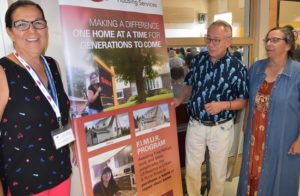Housing top priority for Indigenous Friendship Centres

By Kelly Anne Smith
NORTH BAY—”Friendship Centres are more than just advocates for social housing.” These words from the Executive Director of the Ontario Federation of Indigenous Friendship Centres, Sylvia Maracle. She was in North Bay for the 49th annual conference July 15 held at the North Bay Indigenous Friendship Centre.
“Housing is a human right,” asserts Maracle. “In the hierarchy of needs, we’re taught that food, water, clothing and shelter are primary things. We are taught that from a traditional perspective. So we need to make sure there is shelter. We need to make sure our people aren’t homeless or that people aren’t trying to couch surf. Our young people need to live in safe spaces and our seniors need to be housed with inter-generational supports.”
Maracle talked of providing the safe spaces to call home.
“Friendship Centres increasingly recognize that it is not being done in the way or as quick as the community would like to see. We are taking on an increased role,” says Maracle. “A number of communities in the Anishinabek Nation territory were talked about at the conference, like North Bay, Sault Ste. Marie and Thunder Bay. There are others as well where the local centre is engaged in building houses or being part of small subdivisions or really being creative in adding apartments.”
A board member of the North Bay Indigenous Friendship Centre, Maurice Switzer, spoke of the presentation by the Ontario Aboriginal Housing Services.
“The North Bay Indigenous Friendship Centre is looking to create some different housing opportunities. The big thing is about 80 percent of Indigenous peoples are now living in places like North Bay. Within a 20-mile radius of North Bay, there are 9, 000 Indigenous people. That’s a huge percentage of the population.”
Switzer says there are socio-economic implications.
“Some of them are challenging, but a lot of them are very beneficial helping the local economy.”
First Nations are net contributors to society reasons Switzer.
“The latest study shows that across Canada, First Nations are contributing $30 billion dollars to Canada’s economy. And if the barriers against hiring our people, and training our people and educating our people come down, that contribution will be greater, far greater.”
Across the province there are 28 Friendship Centres serving the needs of urban Indigenous people by providing culturally appropriate services. Maracle herself has provided inspired leadership for 40 years. During the North Bay conference, Maracle received recognition for her long-standing devotion to the Ontario Federation of Indigenous Friendship Centres. Maracle started her career at the organization in a youth leader role as a summer student.
Maracle is enthusiastic explaining the strengths of Indigenous Friendship Centres in Ontario.
“They are grassroots. They are part of the movement. They choose to affiliate with the Ontario Federation of Indigenous Friendship Centres, to work cooperatively and to move it forward. That’s a tremendous strength. Grassroots people have very hands-on practical experience with how people are living in urban centres and rural communities.”
Questioned about challenges ahead, Maracle pointed to difficulties in always supporting government policy.
“It is always about resources.”
Maracle does see very positive outcomes with youth involvement in Ontario’s Friendship Centres.
“We have an Indigenous Youth Council, which has done critical thinking on performance and our direction moving forward.”
The Indigenous Youth Council is committing to having a plan in place within the next few months. Youth make up 25% of the formal board of the federation.
Maracle points to gender parity as historically being a strength of Friendship Centres. She says the six-member executive that was elected during the North Bay conference is made up of three women and three men.
“There were many women voting in that conference hall and that is a strength moving forward. We do have not only knowledgeable grassroots leaders here, but perspectives that women bring to leadership.”


